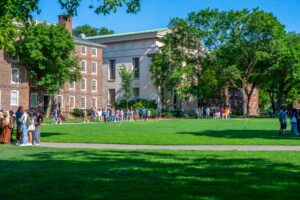Engineering is incredibly popular for students (we have a whole guide on it), and for good reason. Everything around you was designed and built by engineers, and they literally reshape the world we live in. Of course, a lot of work is required to become an engineer, beginning with a college education.
In this article, we’ll examine one such engineering program, engineering honors at Texas A&M. We’ll look at what the program is, how you can apply, and what the benefits are. We’ll also give a case study of a past Ivy Scholars student who applied to the program.
About the Program
The Craig and Galen Brown Engineering Honors Program seeks to offer a “small school” feel with all of the resources of Texas A&M’s program. The course sizes are smaller, and students get additional opportunities to interact with faculty, both in and out of their coursework.
Every major the A&M offers in engineering has an honors counterpart. Each major follows its own track, to ensure that you graduate on time. While not all of the courses you take will be honors level, the majority of them will be.
The other benefits of the honors program come from specialized advising and related opportunities. This gives you increased chances to learn and network with professionals, and to gain additional opportunities in your field. Further, there are increased undergraduate research opportunities for honors students.
Finally, there is an honors-program specific career fair, which can help you land a job right out of undergrad. While networking is less important in engineering compared to some other fields, recruitment at colleges is still a key part of the job hunt process, and recruiters know that honors students have received more preparation and research experience.
While you can get a great engineering education at A&M regardless, we recommend the honors program for advanced students who want to push themselves more, or for students looking for a backup option when applying to higher tier engineering programs.
How to Apply
Admissions to the program are competitive, with around 10% of each class admitted. The applications are reviewed holistically; there is no single GPA or test score which will guarantee you admission. Overall, admissions officers are looking for how well you will fit with the program, and how you will benefit from it.
You may apply to the honors program as a freshman if you have an intended major in engineering or are admitted to the engineering college. You may apply as a current A&M student if your GPA is above 3.5. Incoming transfer students with a GPA of 3.5 or higher may register for honors classes and may apply for the program after a semester at A&M.
The application to the program is separate from your application to A&M as a whole. You may apply online. The application requires the following materials:
- A high school transcript. Current A&M students (or transfer students) also require a college transcript.
- One letter of reference.
- A resume.
- An essay describing your interest in the engineering honors program and your general career goals.
Incoming freshmen and transfer students must submit their applications by May 1st. For a spot in the honors dorm, you must complete your application by March 1st. Current students may submit their application at any time during the school year, but must submit at least two weeks before the start of the semester to be eligible for priority course registration.
Once accepted, you may begin participating in honors activities immediately. You need to be an honors student to register for honors-level courses.
Your application is reviewed based on your academic and extracurricular achievements, your fit for the program, and your passion for engineering. While high academic performance alone will not get you in, it is required for acceptance.

Case Study
For the case study, we’ll discuss who the student was, what they had done with their activities, and finally go through their application essay. We hope this will give you a sense of what a competitive candidate for this program looks like, and how you can prepare to do the same.
Resume
Student B had an unweighted GPA of 3.9 and graduated in the top 10% of their high school class. They had a cumulative ACT score of 31. This academic excellence was enough to qualify them for the program, but it was with their activities that Student B was able to properly differentiate themselves.
First was their coding knowledge; 2 years each of C++ and Python, and 1 year of experience with Linux. Not all engineers are computer engineers, but they all work with software to some extent, and being able to manipulate code is a useful skill for any engineer.
They were further able to apply their coding knowledge through an internship with Code Park Houston. During the course of which they worked to teach coding to others, as well as help research and build out the program’s curriculum and web presence. Thus the student showed an ability to apply their knowledge.
Student B showed further proficiency with coding through their participation in a cybersecurity camp at UT Austin, along with taking part in the science olympiad. These activities continue the themes seen elsewhere and demonstrate an even deeper commitment to engineering.
Finally, Student B was a co-captain on their soccer team. While this does not directly relate to engineering, it allows them to demonstrate leadership, a key quality this program is looking for. Not every activity you participate in needs to be completely tied to engineering, but the majority of your extracurriculars should be. Your goal is to create a story about who you are and what you’ve done, and for that to clearly demonstrate why you’ll be a great engineer.
The Essay
Wandering through the dense jungles of the Malaysian peninsula as a second grader I was awestruck by the vibrant colors: vast green leaves, yellow moss creeping up the trees, and massive red petals from the giant rafflesia flowers that secreted a putrid smell. Birds squawked and monkeys howled within the deep greenery, while insects scurried over the foliage strewn ground beneath my feet.
This experience showed me that nature is necessary for life to flourish. However, the delicate balance is now in danger. By 2050, researchers project millions of animal species will face extinction and many million more humans will be displaced from their homes due to climate change, careless fossil fuel prioritization, forestry, and land degradation.
With these dangers in mind, I want to use my mathematical and analytical knowledge to be an environmental engineer. The best engineers are focused on preventing problems so well that nobody may ever know those problems were possible in the first place.
This was most apparent when I met Mr. Pankaj Rai, a senior engineer at Bechtel. Over the course of our engagement, he helped me understand his job at the intersection of mechanical and environmental engineering.
Mr. Rai’s job was designing something that everybody I know uses, but nobody thinks about: underground gasoline tanks. Balancing between safety and flexibility is tricky because focusing on one quality too much will make the other untenable. Trying to make a system foolproof, he taught me, will also make it less accessible to the technicians that need to work on it. However, the risk of containment failure increases for every convenience and feature added to a tank.
While before, the tasks of engineering seemed arcane, talking with him showed me how ubiquitous this global issue is. Engineering a tank that is a little more reliable could save hundreds of lives; making the tank a little more flexible for technicians could save millions of dollars.
Mr. Rai helped me see that engineering is the application of optimization questions I’ve tackled in statistics and math classes for the past two years. The size and scale of these engineering problems excite me.
As a concerned global citizen and a future student of civil and environmental engineering, I appreciate the meticulous forethought required to cultivate new solutions to crises that threaten some of the world’s oldest and most beautiful landscapes.
Essay Analysis
The purpose of this essay is to explain and explore student B’s interest in and passion for engineering, and why they want to study the specific branch of the field that they do. This specificity is key; engineering is a broad discipline, and interest in one facet doesn’t necessarily translate to another.
The essay begins in the middle of the action, setting a scene for the reader. This is a good way to begin, as it draws the reader into the essay, and invests them in the action. It also helps to set this essay apart, as beginning in a jungle is outside the norm for engineering essays, which more often begin with screens or numbers.
Here, the jungle is appropriate, because student B is specifically interested in environmental engineering. While this requires the same skill in math and science as any other discipline, it also requires an appreciation for the natural world.
This concern then forms the basis for why they want to study environmental engineering. They are passionate about math and science, and they want to use their skills in these fields to better the world as a whole. This is a noble goal, and while your own reasoning does not need to be so grand, having a higher purpose in what you do is often a good approach. Honors programs want to admit students who will go on to change the world, so expressing a desire to do so is a good way to start.
Student B next explains why engineering is their chosen path, based on their interaction with another engineer. This allowed them to see the possibilities in the field, and further solidified their desire to pursue engineering.
Your own reasons for being an engineer can and will vary, but you should elucidate them clearly in your own essay. Explain your reasoning for being an engineer, and what you want to do with the career. You should provide concrete examples from your own experiences, the more specific the better.
You can speak concretely about the specific benefits of the honors program, though this essay does not. That can be a good way to explain how the environment created by the program will benefit you, and why you are a strong applicant.
Final Thoughts
Engineering is a very popular and rewarding field, in which many students want to get involved. Honors engineering allows you additional networking opportunities, smaller class sizes, and greater opportunities to conduct research and meet industry professionals. While attending an honors program is not necessary to become a great engineer, many students are interested in the additional opportunities such programs afford.
We hope that this guide has introduced you to the possibilities offered by A&M’s engineering honors program, and how you can go about applying to it. College applications are always stressful, and honors applications are even more so. If you want to hear how we can help you with your applications, schedule a free consultation today. We have a depth of experience helping students apply to colleges, and are always happy to hear from you.








